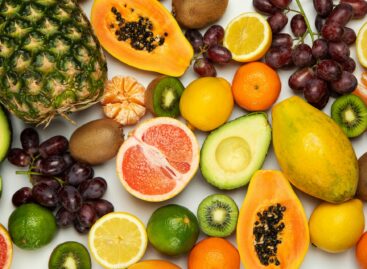Two-thirds of adults don’t eat enough vegetables and fruits
Vegetable and fruit awareness is awakening in Hungary, but it is still too early to talk about true awareness – this is highlighted by a representative research conducted by STADA within the framework of its Seedling Program*. Compared to last year, more adults are aware of the WHO recommendation that we should eat at least 5 servings of vegetables and fruit per day, but according to parents, only four out of ten children eat this much, and only a third of adults. Setting an example and passing on good practices early on would be very important, but who would we expect this from if even the majority of parents don’t do it well?
 What we learn in childhood becomes part of our everyday lives. As adults, we can only change bad habits with great discipline, and many attempts fail. That is why, in addition to washing hands, brushing teeth, greetings, etc., it is worth teaching the basics of proper eating in childhood so that it becomes a habit.
What we learn in childhood becomes part of our everyday lives. As adults, we can only change bad habits with great discipline, and many attempts fail. That is why, in addition to washing hands, brushing teeth, greetings, etc., it is worth teaching the basics of proper eating in childhood so that it becomes a habit.
For example, eating enough vegetables and fruits, as varied as possible, and in season. But who is to teach this, who is to set an example, if even the majority of adults do not do it well?
Improvement is visible, but the goal is still far away
While last year only half of Hungarian adults were aware of the World Health Organization (WHO) recommendation that at least five servings of vegetables and fruit should be consumed daily, this year nearly two-thirds (64%) are aware of this guideline – according to representative research data related to STADA’s Seedling Program.
In addition to knowledge, progress has also been made in positive practice, as last year only one in ten respondents admitted to eating the recommended amount, while in 2025 a third (34%) reported this. Although this is encouraging growth, there is still a long way to go until full awareness. Another warning sign is that parents currently report that six out of ten children do not eat the recommended amount of vegetables and fruit.
“There is still a big gap between knowing something and taking consistent action based on it. Many people already know what they should do, but in the hustle and bustle of everyday life, it is difficult to form this into a lasting habit. The Palánta Program aims to make healthy eating natural from an early age, because what we get used to as children becomes part of our lives”
— said Andrea Ainsworth, STADA Culture & People Manager.
The goal of STADA’s Palánta Program is to make children aware that health begins with proper nutrition, which includes eating enough vegetables and fruit. That’s why they’re taking their attitude-changing program to kindergartens and schools. They most recently visited Karancslapulejtő, where they opened a playful market and health kitchen for children in the courtyard of Kastélykert Kindergarten, conveying a health-conscious attitude. The thematic playground, created with the support of STADA, aims to teach the youngest children the basics of healthy eating and sustainability while playing. The aim of the initiative is to reach families through children: we can do a lot for our environment and our health with small steps, for example by shopping and eating more thoughtfully.
Why is it important to eat at least 5 servings of vegetables and fruit a day?
Eating at least 5 servings of vegetables and fruit a day is important because these nutrients are rich in vitamins, minerals, fiber and antioxidants, which support the immune system, prevent chronic diseases, help maintain a healthy weight and improve digestion. They also contribute to cardiovascular health and mental well-being. 1 serving is, for example, one tomato, 1 small banana, 1 small bowl of berries or 1 medium-sized pepper, apple or orange.
*The survey conducted in May 2024 with 1168 people and then in June 2025 with 1041 people is representative of Hungarian smartphone owners by age, gender, educational level and place of residence for those raising a child or children under 18. The research was conducted by Europion Kft. on behalf of STADA.
Related news
Hungarian vacuum technology could revolutionize space nutrition
🎧 Hallgasd a cikket: Lejátszás Szünet Folytatás Leállítás Nyelv: Auto…
Read more >–15–20 degrees Celsius night frost: fruit trees can mostly withstand it in winter, the risk increases with cooling after the weather has cooled down
🎧 Hallgasd a cikket: Lejátszás Szünet Folytatás Leállítás Nyelv: Auto…
Read more >Related news
NAK President: more than 120 thousand people signed the agricultural petition in one month
🎧 Hallgasd a cikket: Lejátszás Szünet Folytatás Leállítás Nyelv: Auto…
Read more >EY Businessman of the Year: Tibor Veres is the grand prize winner, six special awards were also given out
🎧 Hallgasd a cikket: Lejátszás Szünet Folytatás Leállítás Nyelv: Auto…
Read more >









